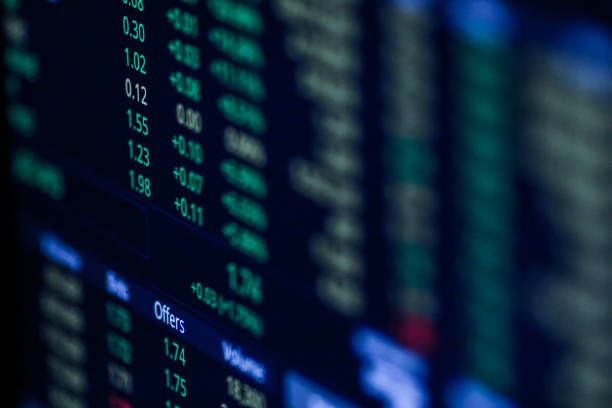Futures Trading Software:
- The Moolah Team
- Jul 3, 2023
- 7 min read
This refers to software used for trading futures contracts, which are agreements to buy or sell a specific commodity or financial instrument at a predetermined price and time in the future.
Futures trading software can provide traders with real-time data, analytics, and tools to make informed trading decisions.
I. Introduction: The Power of Futures Trading Software
The world of futures trading can be both exciting and intimidating. Whether you are a seasoned professional or a novice just starting out, the complexities of the market can be overwhelming. However, with the advent of futures trading software, traders now have access to powerful tools that can help them navigate the market with greater ease and confidence.
At its core, futures trading software is designed to provide traders with real-time data, advanced analytics, and powerful tools to make informed trading decisions. It can help traders analyse market trends, identify potential trading opportunities, and execute trades with speed and efficiency.
But what exactly is futures trading software, and how does it work? In this blog post, we will explore the ins and outs of this exciting technology, from the basics of what it is and how it works, to its benefits and some of the top options available today. Whether you are a seasoned professional or just starting out in the world of futures trading, this blog post is for you.
As we dive into the world of futures trading software, it's important to note that this is not a one-size-fits-all solution. Different traders have different needs, preferences, and trading strategies, so it's essential to find the software that works best for you. With that in mind, we'll take a closer look at some of the most important features of futures trading software, as well as some of the key considerations to keep in mind when choosing the right software for your needs.
At the end of the day, futures trading software can be a game-changer for traders of all levels. Whether you are looking to optimize your trading strategies, streamline your workflow, or simply stay on top of market trends, futures trading software can help you achieve your goals. So without further ado, let's dive into the world of futures trading software and see what this exciting technology has to offer.

II. What is Futures Trading Software?
Futures trading software is a specialized type of software that is designed to help traders analyse the futures market and make informed trading decisions. It provides real-time data, advanced analytics, and powerful tools to help traders stay on top of market trends, identify potential trading opportunities, and execute trades with speed and efficiency.
At its core, futures trading software works by pulling in data from a variety of sources, including market exchanges, news outlets, and social media. This data is then analysed using advanced algorithms and machine learning techniques to identify patterns, trends, and other key indicators that can help traders make better trading decisions.
One of the key benefits of futures trading software is that it allows traders to view market data in real-time, providing them with up-to-the-minute information on market trends and movements. This can be particularly useful in fast-moving markets, where even a small delay can mean missing out on a potentially profitable trade.
Another important feature of futures trading software is the ability to perform advanced technical analysis. This includes tools such as charting, trend analysis, and other indicators that can help traders identify potential trading opportunities and make more informed decisions about when to enter or exit trades.
In addition to these features, many futures trading software platforms also offer a variety of other tools and resources to help traders stay on top of the market. This might include news and analysis from financial experts, educational resources, and even social networking features that allow traders to connect with one another and share tips and strategies.
Of course, not all futures trading software is created equal, and there are many different platforms available on the market today. Some of the most popular options include NinjaTrader, TradeStation, and Sierra Chart, each of which offers its own unique features and benefits.
Ultimately, the goal of futures trading software is to help traders make better, more informed trading decisions. Whether you are a seasoned professional or just starting out, these tools can be an invaluable asset in navigating the complexities of the futures market.

III. Key Features of Futures Trading Software
Futures trading software is designed to provide traders with a wide range of features and tools to help them navigate the complexities of the futures market.
Here are some of the key features that you can expect to find in most futures trading software platforms:
A. Real-time Data:
One of the most important features of futures trading software is the ability to view real-time market data. This allows traders to stay up-to-date on market trends and movements, and can be particularly useful in fast-moving markets where even a small delay can mean missing out on a potentially profitable trade.
B. Advanced Charting:
Most futures trading software platforms offer advanced charting tools that allow traders to perform technical analysis on a wide range of assets. This might include features such as custom indicators, trend lines, and other charting tools that can help traders identify potential trading opportunities.
C. Automated Trading:
Many futures trading software platforms also offer automated trading capabilities, allowing traders to set up rules-based trading strategies that can execute trades automatically. This can be particularly useful for traders who are looking to take advantage of market movements in real-time, without having to manually execute trades themselves.
D. Backtesting:
Backtesting is another important feature of futures trading software, allowing traders to test their trading strategies against historical market data. This can help traders identify potential weaknesses in their strategies and make adjustments before committing real money to a trade.
E. News and Analysis:
Many futures trading software platforms also offer news and analysis from financial experts, providing traders with additional insights and information that can help them make better trading decisions.
F. Risk Management:
Finally, risk management is another important feature of futures trading software. This might include tools such as stop-loss orders, which can help traders limit their losses in the event of an unexpected market movement.
Of course, not all futures trading software platforms are created equal, and the specific features and tools offered can vary widely depending on the platform. That's why it's important to do your research and choose a platform that meets your specific needs and trading style.

IV. Choosing the Right Futures Trading Software
With so many futures trading software platforms on the market, choosing the right one for your trading needs can be a daunting task.
Here are some factors to consider when evaluating different futures trading software options:
A. User Interface:
The user interface of the trading software is an important factor to consider. Look for software that is easy to navigate and intuitive to use. A cluttered or confusing interface can make it difficult to find the tools and features you need, which can slow you down when making trades.
B. Cost:
Cost is another important factor to consider when evaluating futures trading software platforms. Some platforms charge a monthly subscription fee, while others may charge per trade or offer a flat fee for unlimited trading. Consider your trading volume and budget when evaluating different pricing models.
C. Reliability:
Reliability is essential in any trading platform. Look for software that has a track record of reliability and uptime, and that offers 24/7 customer support in case of technical issues.
D. Range of Features:
As we discussed in the previous section, the range of features offered by different futures trading software platforms can vary widely. Consider which features are most important to you, and look for a platform that offers those tools and capabilities.
E. Security:
Security is also a critical factor to consider when choosing a futures trading software platform. Look for software that uses encryption to protect your personal and financial data, and that offers two-factor authentication to prevent unauthorized access.
F. Mobile Compatibility:
Many traders prefer to have the flexibility to trade on the go, so consider whether the trading software you're evaluating offers a mobile app or a mobile-optimized web interface.
G. Reputation:
Finally, consider the reputation of the futures trading software platform you're evaluating. Look for reviews and ratings from other traders to get a sense of the platform's strengths and weaknesses, and to ensure that it has a solid track record of success.
By considering these factors and doing your due diligence when evaluating different futures trading software platforms, you can choose a platform that meets your needs and helps you achieve your trading goals.

V. Conclusion: The Advantages of Futures Trading Software
Futures trading software can provide traders with a wide range of tools, analytics, and data to help them make informed trading decisions.
Whether you're a professional trader or just starting out, using futures trading software can offer a number of advantages, including:
A. Real-Time Data:
Futures trading software can provide traders with real-time market data, which can be critical when making split-second trading decisions. With up-to-the-minute information about price movements, news events, and other factors, traders can respond quickly to changes in the market.
B. Advanced Analytics:
Many futures trading software platforms offer advanced analytics tools that can help traders identify trends, patterns, and other important insights. These tools can help traders make more accurate predictions about future price movements and make more profitable trades.
C. Risk Management:
Futures trading software can also help traders manage risk more effectively. By using tools like stop-loss orders, traders can limit their potential losses and minimize their exposure to market volatility.
D. Customization:
Futures trading software platforms often offer a high degree of customization, allowing traders to tailor their trading experience to their individual needs and preferences. Whether you prefer a particular charting style, technical indicator, or trading strategy, you can find a platform that meets your unique requirements.
E. Access to Global Markets:
Futures trading software can give traders access to global markets, allowing them to trade a wide range of commodities and financial instruments from around the world. This can provide opportunities for diversification and can help traders take advantage of emerging market trends.
Overall, futures trading software can be a powerful tool for traders who want to stay on top of the markets and make informed, profitable trading decisions. By choosing the right platform, customizing your experience, and using the advanced tools and analytics available, you can maximize your potential for success in the world of futures trading.
Thanks for reading this in-depth exploration of futures trading software. We hope this post has provided you with valuable insights into the benefits and features of these powerful tools for traders. If you enjoyed this post and want to stay up-to-date with the latest news and analysis in the world of futures trading, be sure to subscribe to our newsletter. Thanks again, and happy trading!
From Moolah.







Comments